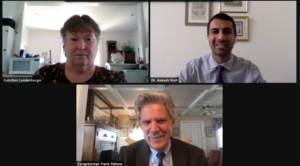Democrats Advocate for Lower Drug Prices As Republicans Go to Bat for Big Pharma
Washington, DC — Today, the House Energy and Commerce Health Subcommittee held a hearing on legislation to lower the cost of prescription drugs. The hearing, led by Energy and Commerce Chairman Frank Pallone (D-NJ-06) and Health Subcommittee Chairwoman Anna G. Eshoo (D-CA-18), focused on a number of proposals to bring down drug prices, including the Elijah E. Cummings Lower Drug Costs Now Act (H.R. 3). Democrats in the hearing made a strong and compelling case for giving Medicare the power to negotiate with drug companies for lower prices. Republicans, meanwhile, went to bat for Big Pharma which is enjoying record profits and is breaking records for the money it’s spending on K Street lobbyists to block any legislation to lower prices for patients. In response, Protect Our Care Chair Leslie Dach issued the following statement:
“We commend Chairman Pallone, Chairwoman Eshoo, and House Democrats for holding this important hearing on one of the biggest concerns for American families: the skyrocketing price of prescription drugs. Year after year, we see unjustified price hikes on lifesaving drugs like insulin and, even during the pandemic, drug companies have already raised the prices of more than a thousand medicines. It is unacceptable that Americans have to pay three times as much for drugs as people in other countries and downright wrong that people are forced to choose between taking their medicine and buying their groceries.
“H.R. 3 would finally put an end to Big Pharma’s greed by including the single most effective way to lower drug prices: giving Medicare the power to negotiate on behalf of all Americans. There has never been a more critical time to bring down drug prices, and today’s discussion sends a strong message that Democrats are laser-focused on delivering on their health care promises for the American people.”
BACKGROUND:
Democrats’ Drug Pricing Proposal Would Save Taxpayers Nearly $500 Billion Over The Next 10 Years. Analyses from the nonpartisan Congressional Budget Office and the CMS Office of the Actuary the bill confirmed it would reduce negotiated drug prices by as much as 55%– saving patients an estimated $158 billion over the next few years and decreasing deficits by $456 billion.
H.R. 3 Could Save Patients Thousands Of Dollars On Costly Medications. The Center for American Progress calculated average savings for several drugs that would likely meet the criteria for negotiation under H.R. 3. In addition to achieving thousands of dollars in monthly savings on expensive treatments for conditions like cancer and multiple sclerosis, H.R. 3 would help lower the cost of insulin for some diabetics by more than $700 annually.
Additional information on rising drug costs can be found here: The Time To Act Is Now: Lower Drug Prices For All Americans.

